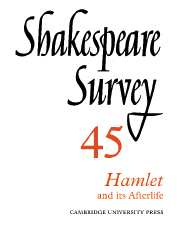Book contents
- Frontmatter
- The Reception of Hamlet
- ‘Hamlet, Revenge!’: The Uses and Abuses of Historical Criticism
- Revision by Excision: Rewriting Gertrude
- Gazing at Hamlet, or the Danish Cabaret
- ‘He’s Going to his Mother’s Closet’: Hamlet and Gertrude on Screen
- Shakespeare Rewound
- Freud’s Hamlet
- ‘Pray you, undo this button’: Implications of ‘Un-’ in King Lear
- Marx and Shakespeare
- Peter Street, 1553–1609: Builder of Playhouses
- Shakespeare Performances in England 1990–1
- Professional Shakespeare Productions in the British Isles, January–December 1990
- 1 Critical Studies
- 2 Shakespeare’s Life, Times, and Stage
- 3 Editions and Textual Studies
- Books Received
- Index
1 - Critical Studies
Published online by Cambridge University Press: 28 March 2007
- Frontmatter
- The Reception of Hamlet
- ‘Hamlet, Revenge!’: The Uses and Abuses of Historical Criticism
- Revision by Excision: Rewriting Gertrude
- Gazing at Hamlet, or the Danish Cabaret
- ‘He’s Going to his Mother’s Closet’: Hamlet and Gertrude on Screen
- Shakespeare Rewound
- Freud’s Hamlet
- ‘Pray you, undo this button’: Implications of ‘Un-’ in King Lear
- Marx and Shakespeare
- Peter Street, 1553–1609: Builder of Playhouses
- Shakespeare Performances in England 1990–1
- Professional Shakespeare Productions in the British Isles, January–December 1990
- 1 Critical Studies
- 2 Shakespeare’s Life, Times, and Stage
- 3 Editions and Textual Studies
- Books Received
- Index
Summary
GENERAL STUDIES AND COLLECTIONS
Three contributions to the study of Shakespeare’s reception begin this year’s survey. A special issue of Michigan Germanic Studies (15, 1989) is devoted to eighteenth-century France and Germany. Among other essays, Kenneth E. Larson points out how limited was the range of Shakespeare plays to which reference was made (the major tragedies plus Julius Caesar) (pp. 114–35). Byron R. Wells sees Le Tourneur’s (comparatively) literal translation of Shakespeare marking a shift of attitude from the earlier part of the century, where a translator’s duty had been to rework and improve the original (pp. 160–70). Judith P. Aikin gives an account of the intertextual dialogue between Lessing’s Minna von Barnhelm and Shakespeare’s Othello and Merchant of Venice (pp. 171–89), noting the ways in which Lessing’s text comments upon and revises the originals by locating struggle within the individual consciousness, and giving a more central place to female self-determination.
Rajiva Verma considers one branch of Shakespeare criticism in Myth, Ritual and Shakespeare (New Delhi: Spantech, 1990). Bearing the marks of its doctoral thesis origins, the book surveys in a rather undifferentiated fashion studies of the plays from the mid-nineteenth century onwards which can (sometimes with some effort) be accommodated to the categories of myth and ritual.
Much more ambitious and rewarding is Hugh Grady's The Modernist Shakespeare (Oxford: Oxford University Press, 1990). He sees the story of Shakespeare criticism in this century as one of an 'interplay between the forces of modernization (economic, scientific, and technical) and of modernism (cultural and aesthetic in relation to the former)'. Beginning with the scientism of the disintegrators of the late nineteenth and early twentieth centuries and continuing through to the diverse voices which are making the 'postmodern Shakespeare', he charts the tensions and accommodations between these two impulses that have characterized the Shakespeare industry.
- Type
- Chapter
- Information
- Shakespeare Survey , pp. 159 - 175Publisher: Cambridge University PressPrint publication year: 1992



